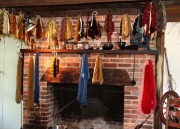Difference between revisions of "Dye"
| Line 2: | Line 2: | ||
== Description == | == Description == | ||
| − | A compound that absorbs into and colors another material. A dye is generally a complex organic material. The process of coloring fibers with natural dyes has been practiced for thousands of years. [[Natural dyes]] were extracted from from plants ([[alkanet]], [[annatto]], [[archil]], [[brazilwood]], [[buckthorn berries]], [[cudbear]], [[cutch (dye)| | + | A compound that absorbs into and colors another material. A dye is generally a complex organic material. The process of coloring fibers with natural dyes has been practiced for thousands of years. [[Natural dyes]] were extracted from from plants ([[alkanet]], [[annatto]], [[archil]], [[brazilwood]], [[buckthorn berries]], [[cudbear]], [[cutch (dye)|Cutch]], [[fustic]], [[madder]], [[indigo]], [[litmus]], [[logwood]], [[morinda]], [[quercitron]], [[safflower]], [[saffron]], [[sassafras]], [[sumac]], [[turmeric]], [[turnsole]], [[black walnut dye|Walnut]], [[weld dye|Weld]], and [[woad]].), lichens ([[archil]]), insects ([[kermes]], [[lac dye]], [[cochineal]]) and shellfish ([[Tyrian purple]]). Synthetic dyes, first derived in 1856 from coal-tar extracts, were brighter, less expensive, more colorfast and quickly replaced most natural dyes. [[Synthetic dyes]], of which there are over ten thousand, are generally categorized into groups based on their reactivity, their solubility and their method of application. |
For more information see entries on the following: [[acid dye]]; [[aniline dye]]; [[anthraquinone dye]]; [[azo dye]]; [[basic dye]]; [[vat dye]]; [[developed dye]]; [[direct dye]]; [[disperse dye]]; [[fiber-reactive dye]]; [[metallized dye]]; [[naphthol pigment|naphthol dye]]; [[sulfur dye]] | For more information see entries on the following: [[acid dye]]; [[aniline dye]]; [[anthraquinone dye]]; [[azo dye]]; [[basic dye]]; [[vat dye]]; [[developed dye]]; [[direct dye]]; [[disperse dye]]; [[fiber-reactive dye]]; [[metallized dye]]; [[naphthol pigment|naphthol dye]]; [[sulfur dye]] | ||
Revision as of 09:20, 28 October 2020
Description
A compound that absorbs into and colors another material. A dye is generally a complex organic material. The process of coloring fibers with natural dyes has been practiced for thousands of years. Natural dyes were extracted from from plants (Alkanet, Annatto, Archil, Brazilwood, Buckthorn berries, Cudbear, Cutch, Fustic, Madder, Indigo, Litmus, Logwood, Morinda, Quercitron, Safflower, Saffron, Sassafras, Sumac, Turmeric, Turnsole, Walnut, Weld, and Woad.), lichens (Archil), insects (Kermes, Lac dye, Cochineal) and shellfish (Tyrian purple). Synthetic dyes, first derived in 1856 from coal-tar extracts, were brighter, less expensive, more colorfast and quickly replaced most natural dyes. Synthetic dyes, of which there are over ten thousand, are generally categorized into groups based on their reactivity, their solubility and their method of application.
For more information see entries on the following: Acid dye; Aniline dye; Anthraquinone dye; Azo dye; Basic dye; Vat dye; Developed dye; Direct dye; Disperse dye; Fiber-reactive dye; Metallized dye; naphthol dye; Sulfur dye
Synonyms and Related Terms
dyestuff; dyes; teinture (Fr.); Farbstoffe (Deut.); substancje barwi¹ce (Pol.); colorante (Esp.); corante (Port.)
Resources and Citations
- Colorant Industry History (in U.S.) at colorantshistory.org
- R. J. Gettens, G.L. Stout, Painting Materials, A Short Encyclopaedia, Dover Publications, New York, 1966
- Reed Kay, The Painter's Guide To Studio Methods and Materials, Prentice-Hall, Inc., Englewood Cliffs, NJ, 1983
- Ralph Mayer, A Dictionary of Art Terms and Techniques, Harper and Row Publishers, New York, 1969 (also 1945 printing)
- Wikipedia: http://en.wikipedia.org/wiki/Dye (Accessed Mar. 1, 2006)
- Random House, Webster's Encyclopedic Unabridged Dictionary of the English Language, Grammercy Book, New York, 1997
- The American Heritage Dictionary or Encarta, via Microsoft Bookshelf 98, Microsoft Corp., 1998
- Art and Architecture Thesaurus Online, http://www.getty.edu/research/tools/vocabulary/aat/, J. Paul Getty Trust, Los Angeles, 2000
